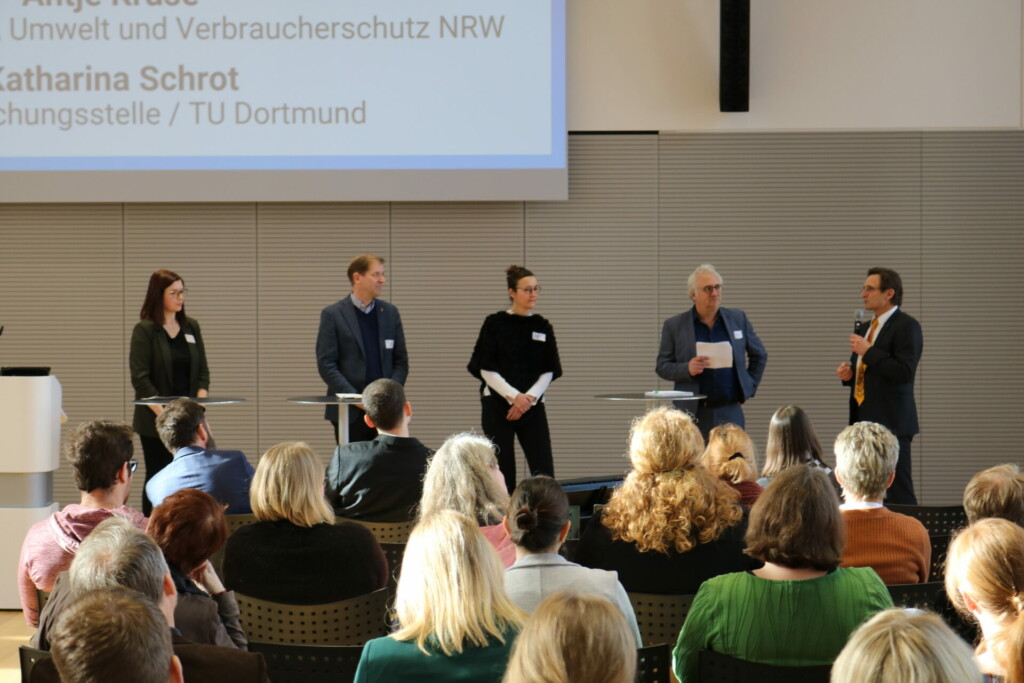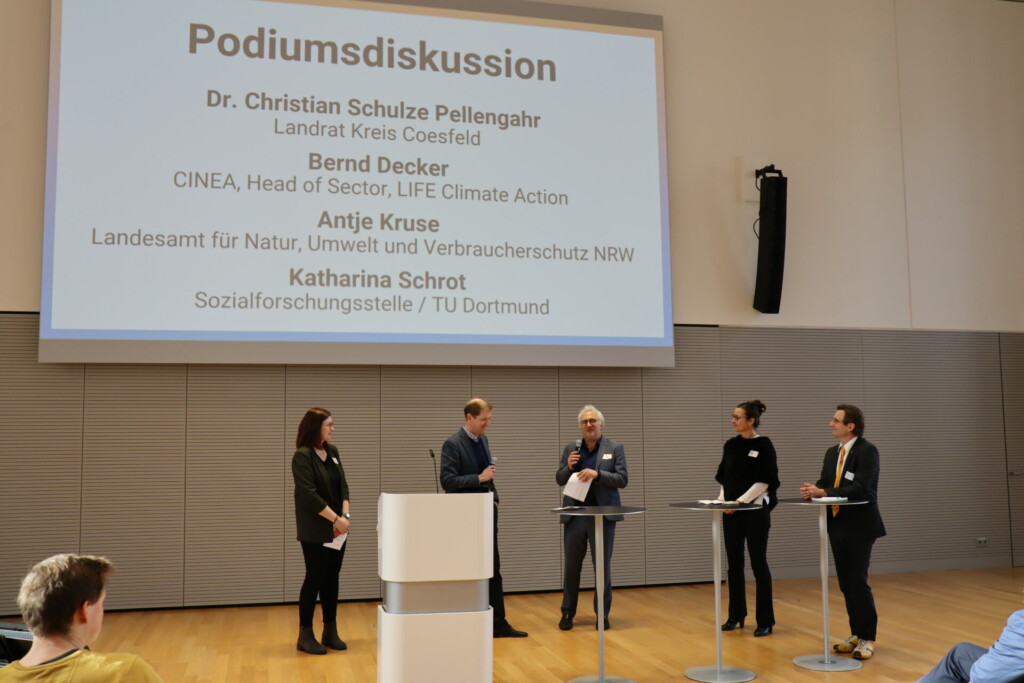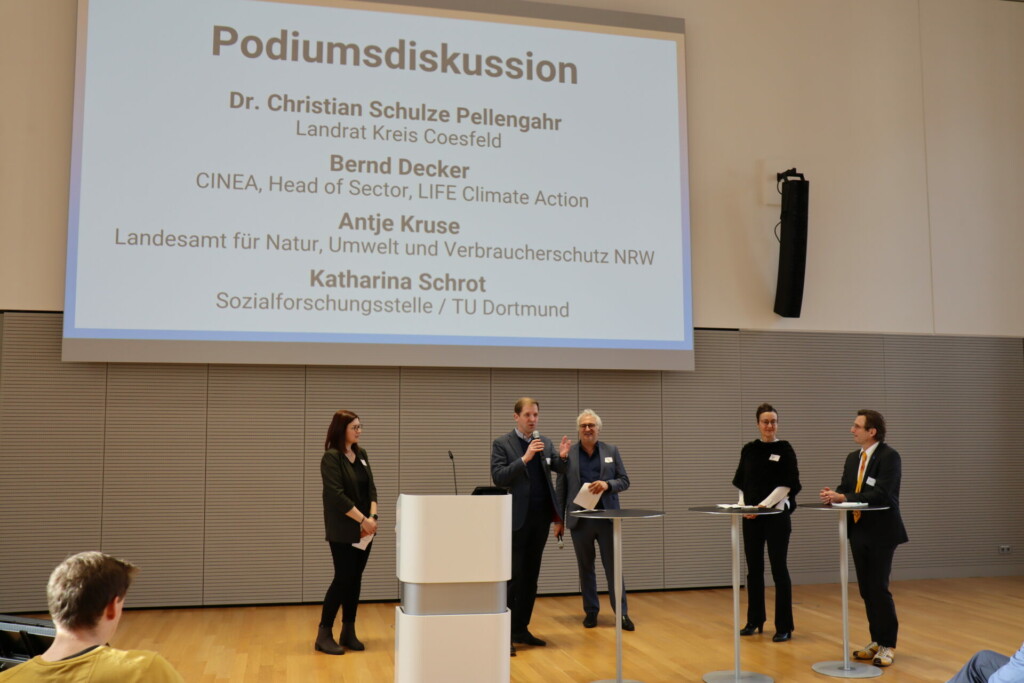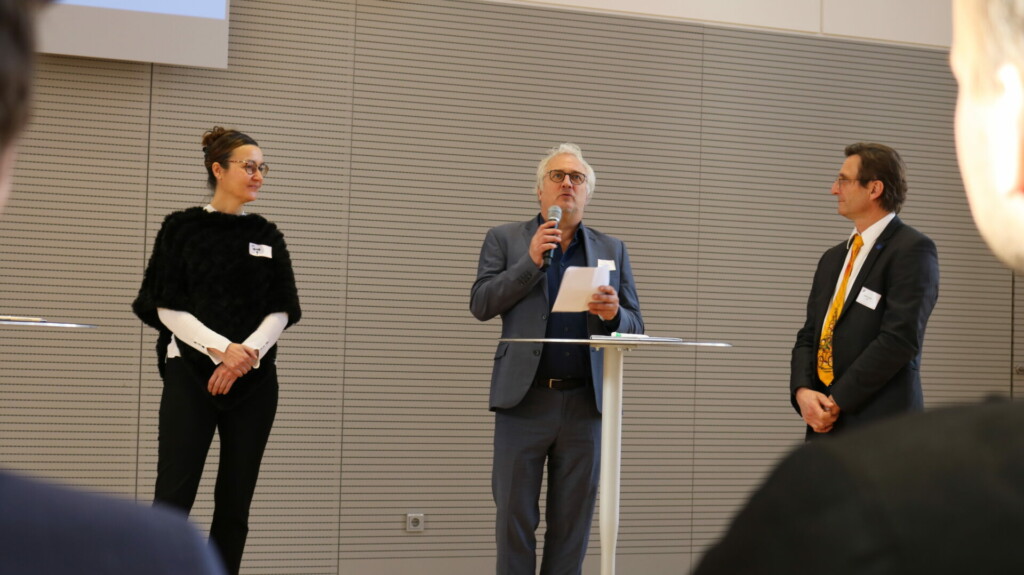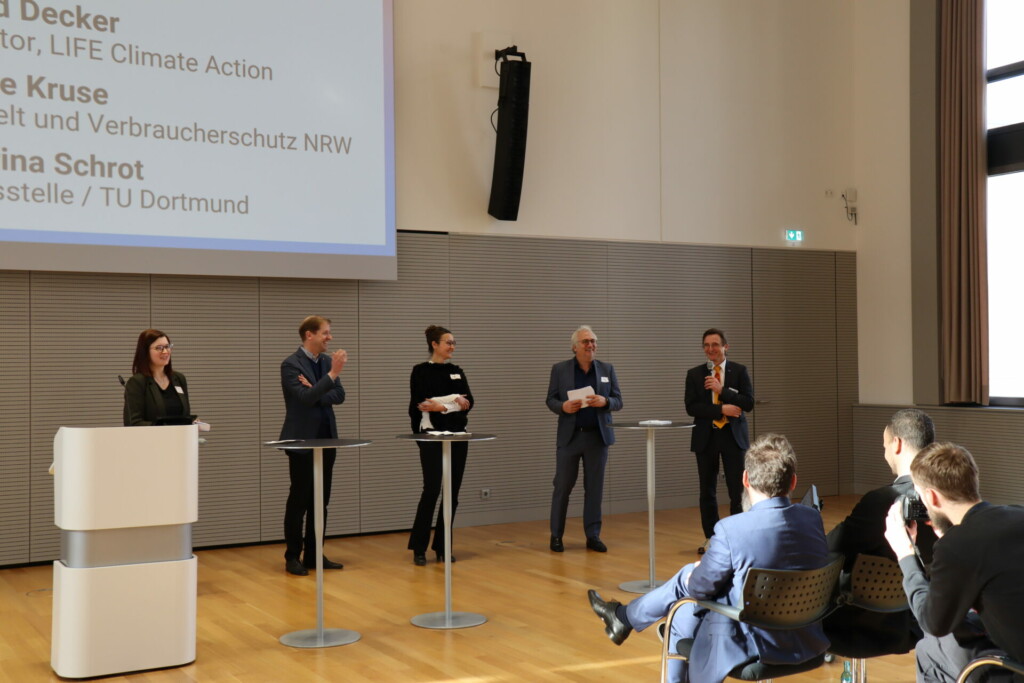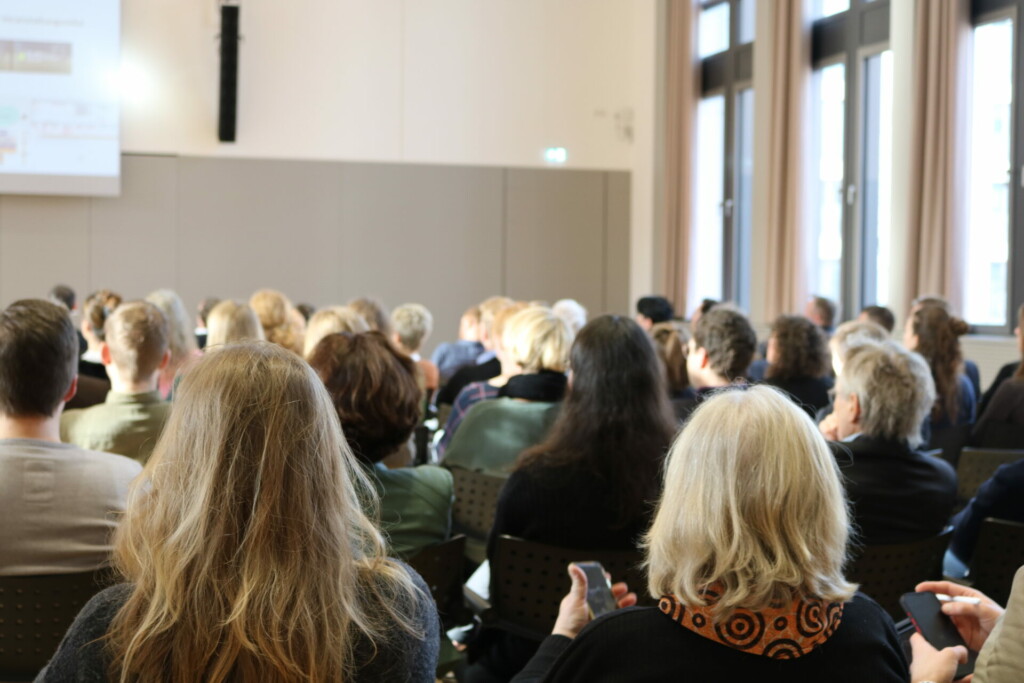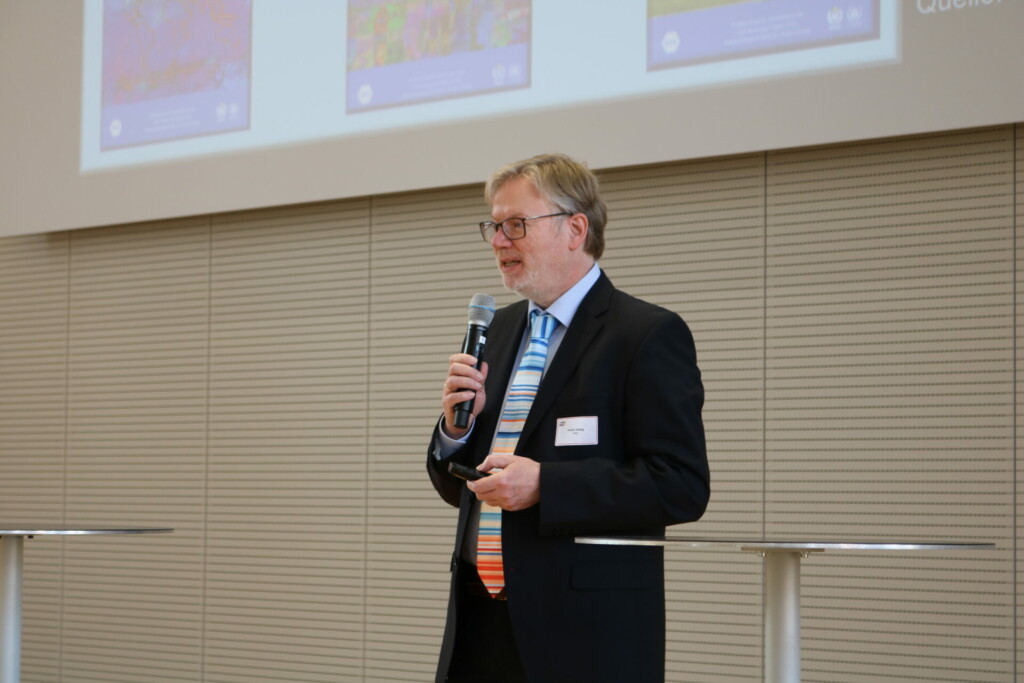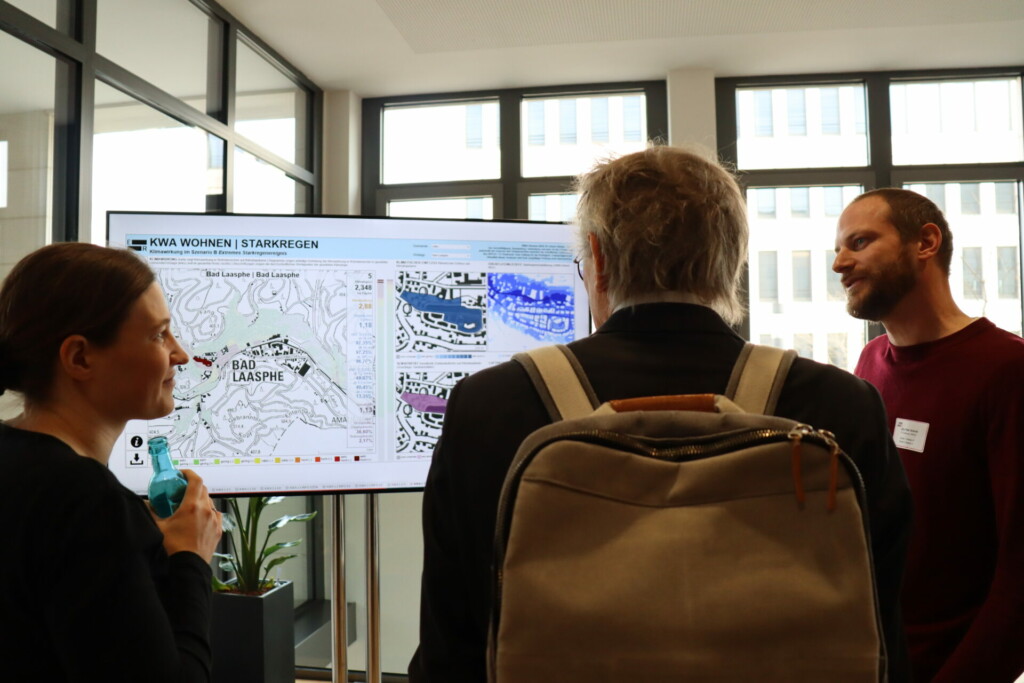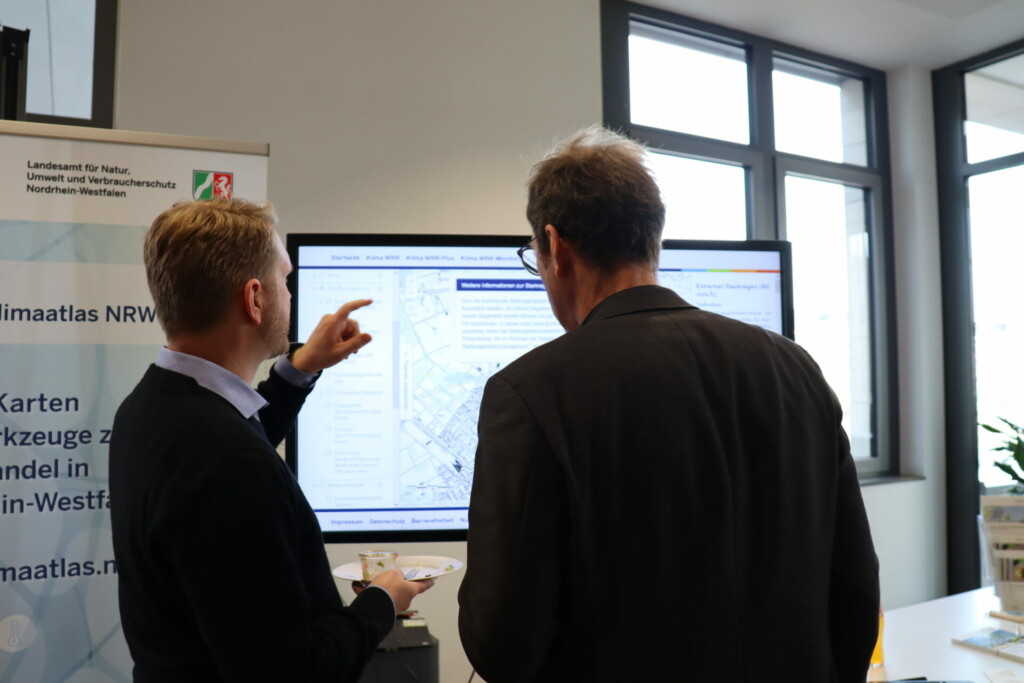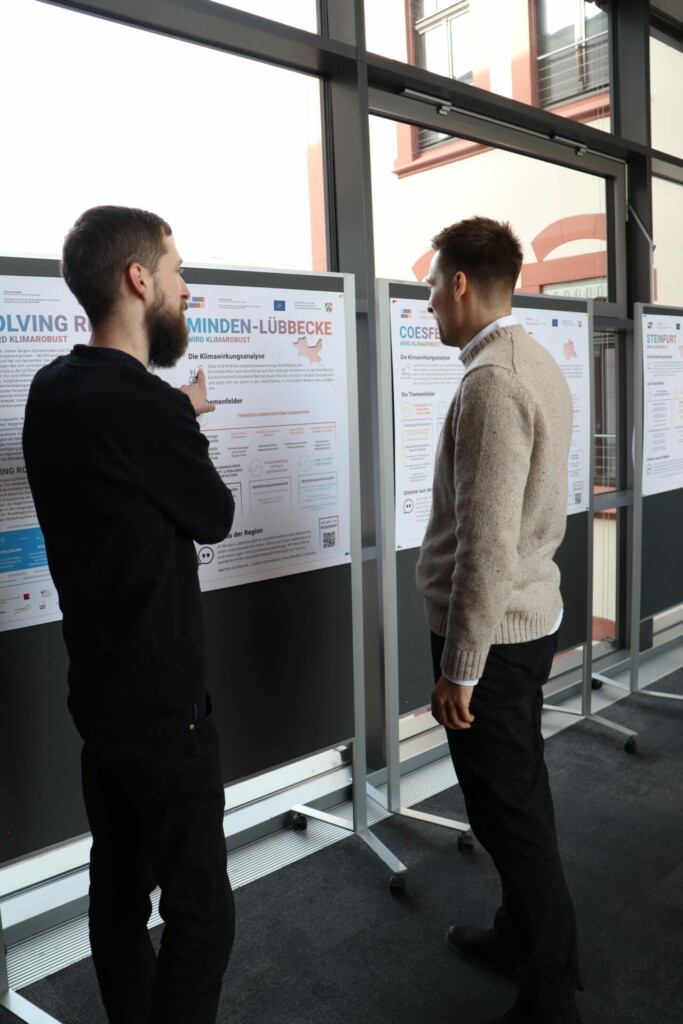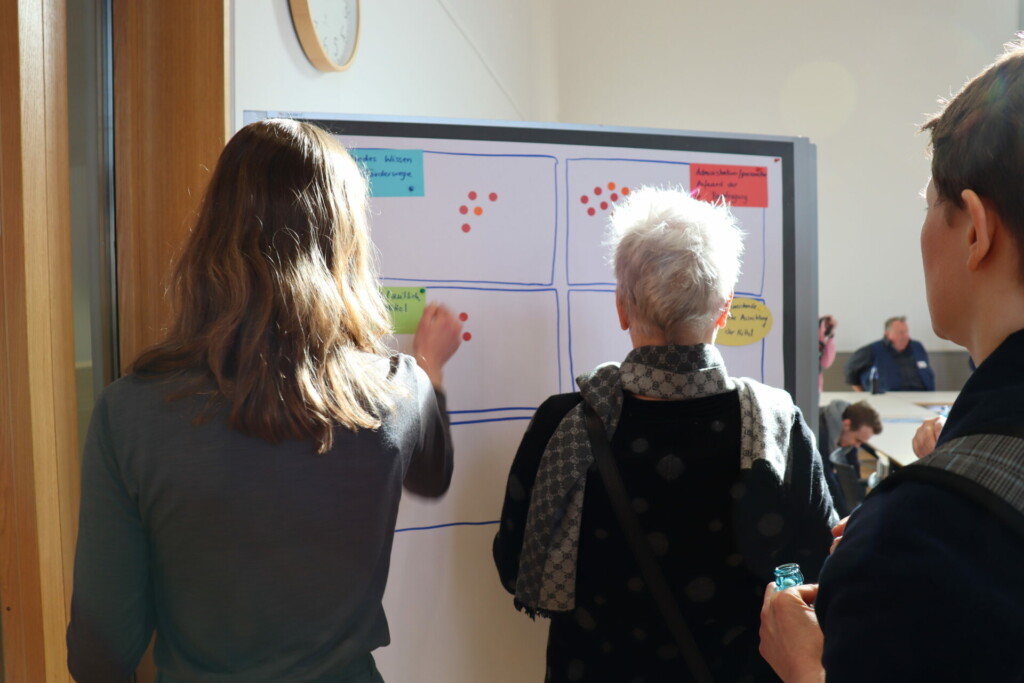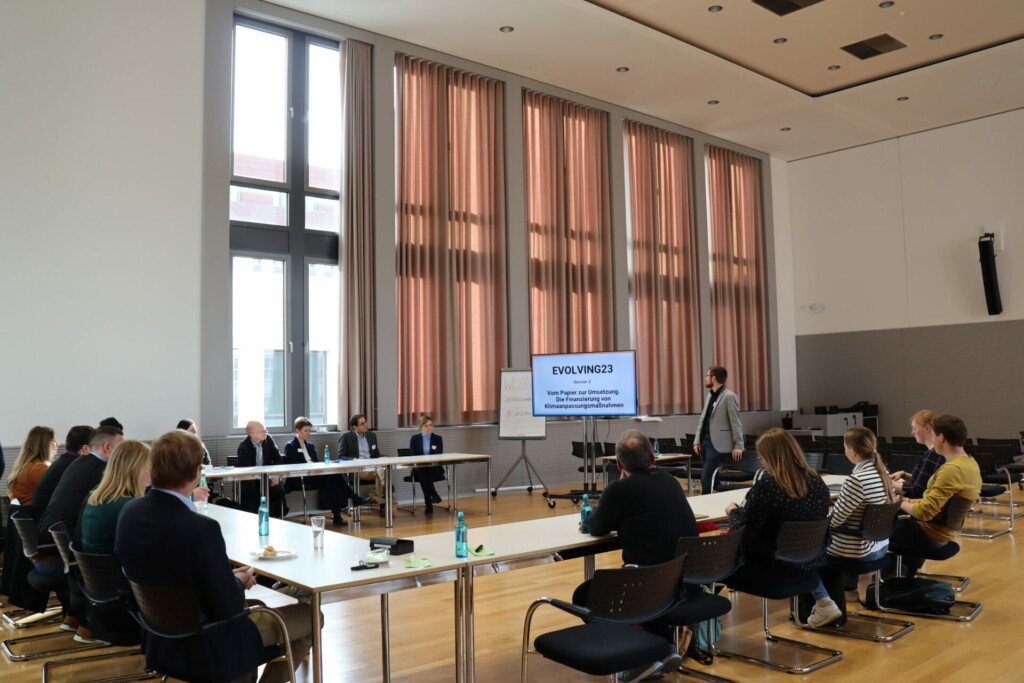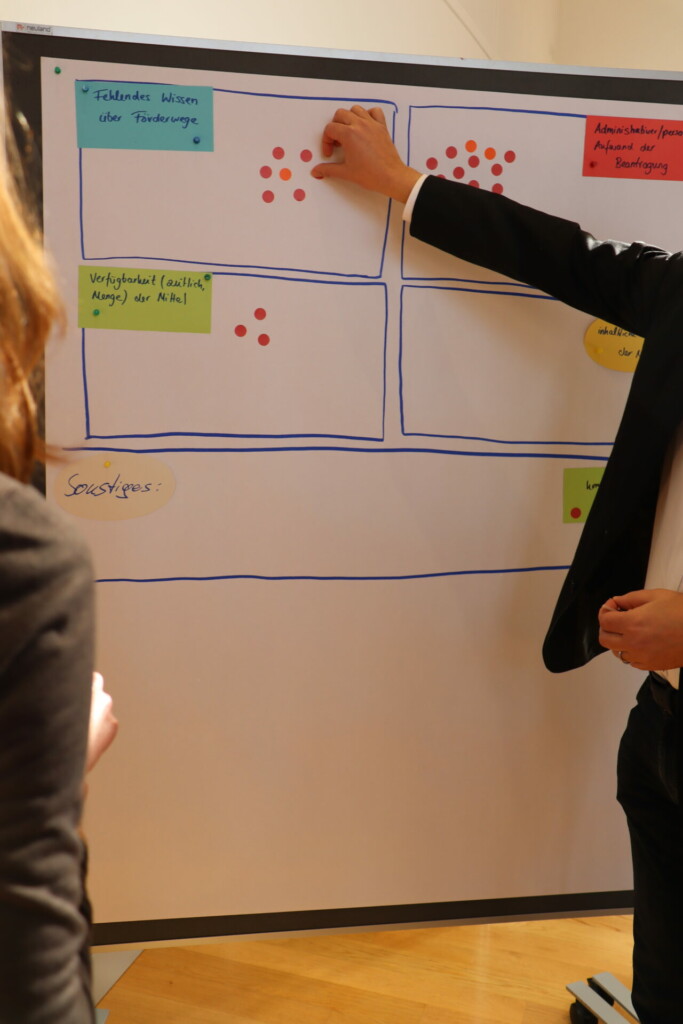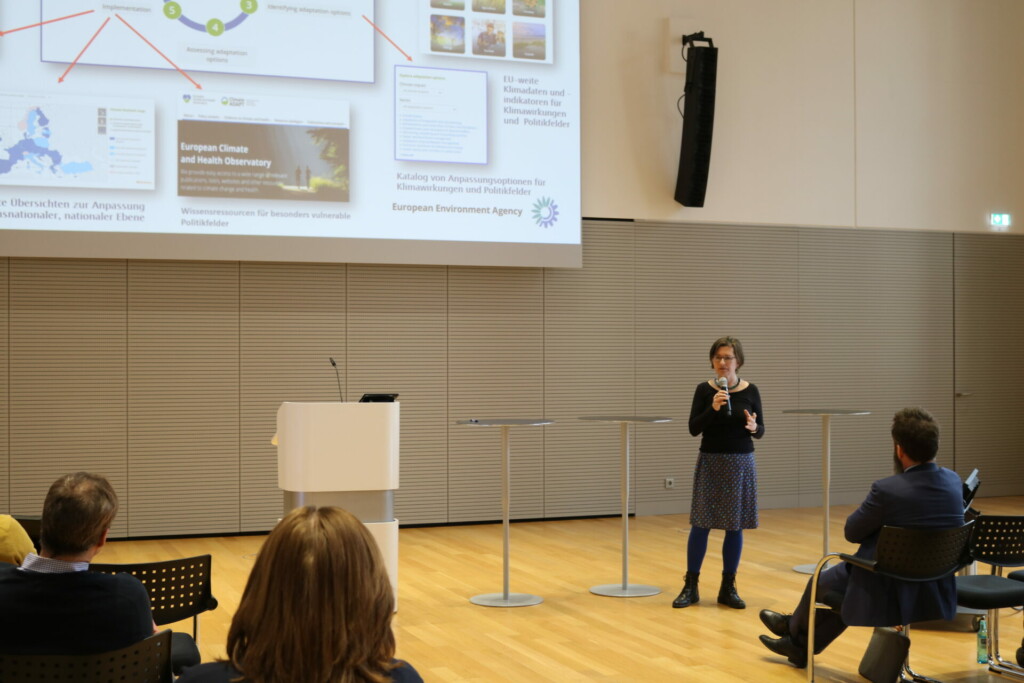On Thursday, 09 February 2023, the Evolving23 conference took place as part of the Evolving Regions project. At the Sparkassenakademie NRW in Dortmund, the approximately 100 participants were able to follow a varied program with impulses and a panel discussion in the morning as well as substantive discussions in five different content sessions in the afternoon and exchange ideas on topics of climate adaptation in rural areas. Under the title “Evolving23 – Climate adaptation in rural areas – Departure for implementation”, the focus was on challenges in the implementation of climate adaptation in rural areas.
Welcome & Lectures
Jürgen Schultze from the Social Research Centre of the TU Dortmund moderated the day and welcomed NRW Environment Minister Oliver Krischer from the Ministry of the Environment, Nature Conservation and Transport on stage at the beginning of the event. In his presentation, Minister Krischer described the relevance of climate change adaptation and presented the goals and plans of the state of NRW. In particular, he highlighted the Climate Adaptation Act as the first law on the subject in Germany. Against the background of the flood disaster in the summer of 2021, it is more important than ever to continue to promote climate adaptation. Events such as Evolving23 could also contribute to this:
“The events of recent years, such as the flood disaster in 2021 or last year’s heat and drought summer, have shown us all the dramatic effects of the climate crisis in our own country. Not only urban centres were affected, but also rural areas. With the ‘Evolving Regions’ project, the state of North Rhine-Westphalia is supporting seven districts in their efforts to increase climate resilience. I am very pleased to see how successfully the project has been carried out and how committed the participating regions are in initiating and implementing adaptation processes. Events such as the final conference ‘Evolving23’, in which experts and people from the regions meet, are also important for exchange and mutual learning.”
Oliver Krischer – Minister for the Environment, Nature Conservation and Transport NRW (MUNV NRW)
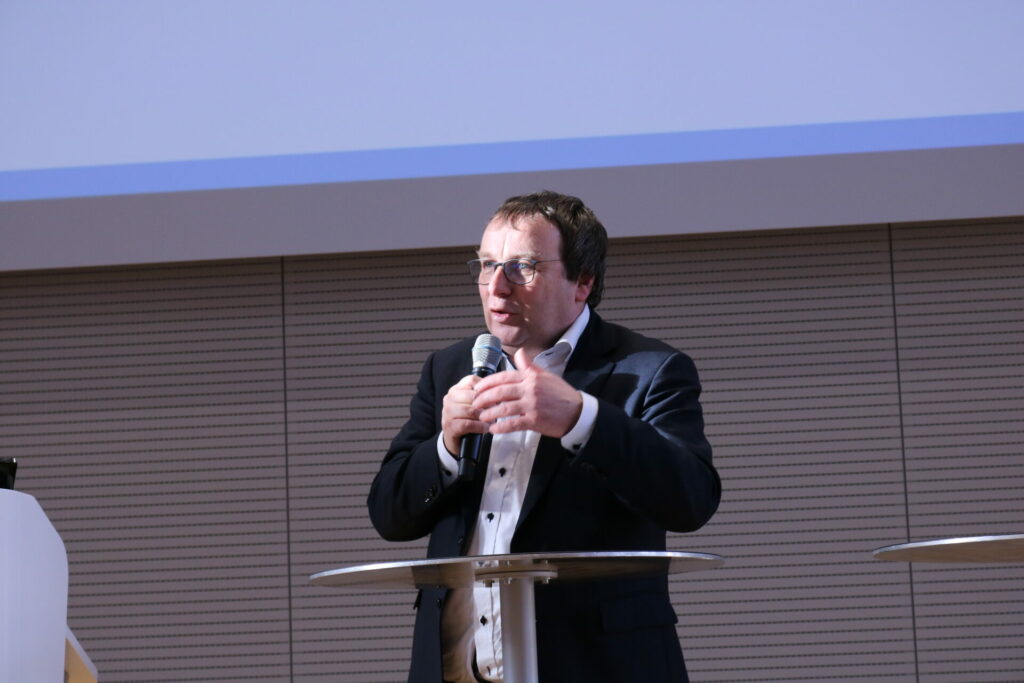
Following the impulse of Minister Krischer, Bernd Decker from the LIFE funding programme and the agency CINEA (xx) placed the project in the European level of climate adaptation. Against this background, he stressed the need for innovative and more systemic climate adaptation. The implementation of the measures developed in Evolving Regions plays an important role in this:
“I am impressed by the catalogue of measures and the planned activities in the individual thematic areas of the Evolving Regions project. By strengthening participation and planning capacities, the Social Research Centre makes an important contribution to implementation, especially since social innovations are very important in this area. And now it is a matter of mobilising the appropriate resources. I am very happy that we are now talking about implementation!”
Bernd Decker | Acting Head of Sector LIFE Climate Action, CINEA
Subsequently, Katharina Schrot from the Social Research Centre of the TU Dortmund presented the project and the project results of Evolving Regions. The presentation can be downloaded via the following link.
Following Katharina Schrot’s presentation, two regional promoters from the Evolving Regions regions reported. It all started with Dr. Christine Heybl as a former promoter from the district of Coesfeld. Dr. Ingo Möller from the district of Lippe also presented the results of the region in the project in his lecture. The presentations of both presentations can be downloaded here:
Panel discussion
In the subsequent panel discussion, the participants focused on climate adaptation in rural regions, possible ways to implement adaptation strategies and future tasks and challenges. Also present were District Administrator Dr. Christian Schulze Pellengahr from the district of Coesfeld, Bernd Decker from CINEA, Antje Kruse from LANUV NRW and Katharina Schrot from the Social Research Centre of the TU Dortmund. In the discussion, the different perspectives of the discussion participants became clear. Antje Kruse emphasized the relevance of rural areas in NRW and emphasized that climate adaptation is a joint task. Bernd Decker, on the other hand, emphasized the relevance of innovative ideas and mutual learning from a European perspective. Katharina Schrot contributed her experiences from the project Evolving Regions and spoke about the necessity of cross-stakeholder processes in climate adaptation and the challenges in consolidating the project results.
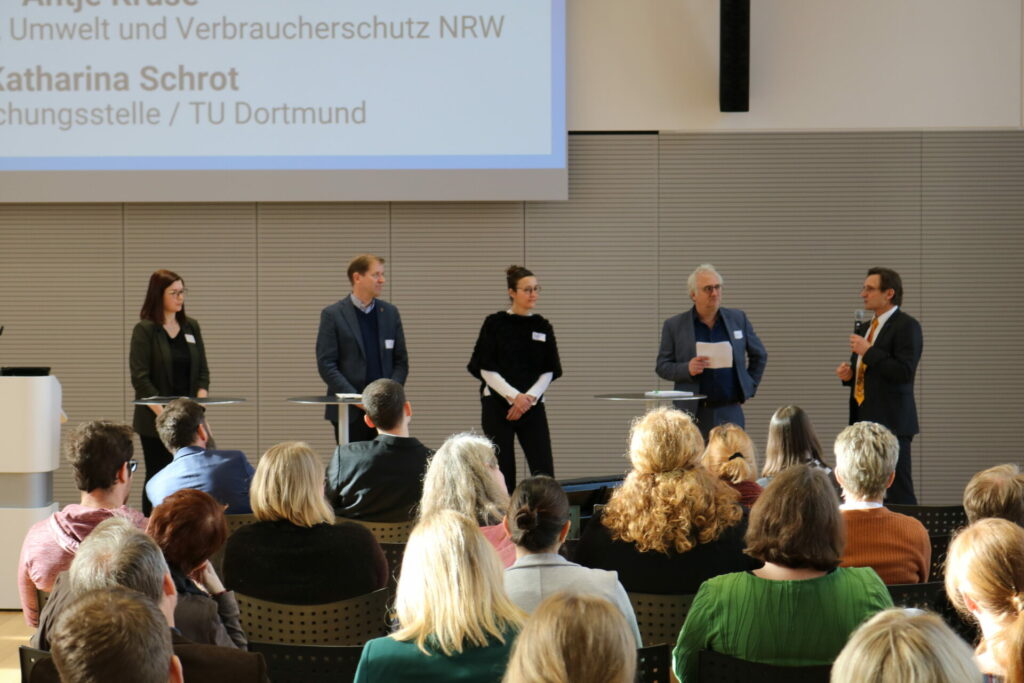
District Administrator Dr. Christian Schulze Pellengahr emphasized that climate change and adaptation to the associated consequences do not stop at the borders of local authorities, which is why not only mutual learning is important, but also that the EU offers a framework in which this exchange can take place. He also addressed the challenges on the ground, where human and financial resources in particular are scarce.
Click through our gallery with a selection of quotes from the panelists:
Project and discussion results of the project against the background of current results of the World Council (IPCC) – Guido Halbig
At the end of the morning, Guido Halbig from the German Weather Service classified the results of the panel discussion and the Evolving Regions project against the background of the work of the Intergovernmental Panel on Climate Change (IPCC). He pointed out that the Evolving Regions project would address many adaptation measures identified as relevant by the IPCC. In addition, he stressed that, in addition to adaptation, urgently necessary climate protection measures must continue to be taken in order to meet the goals of the Paris Climate Agreement. Mr. Halbig combined this with an appeal to act and to continue efforts in four climate-relevant areas:
- Mitigating climate change
- Adaptation to the consequences of climate change
- Improving biodiversity
- Achieving the Sustainable Development Goals
Mr. Halbig’s presentation can be downloaded here for internal purposes. If you intend to reuse parts or individual slides of the presentation, please contact Mr. Halbig personally in advance.
The second part of the day: The sessions
In the second part of the day, the participants had the opportunity to exchange ideas on various topics with other participants and experts in sessions.
In two rounds, the participants were able to participate in one of the following sessions:

Session 1: Integrating climate adaptation into municipal decision-making processes
In the first session, Dr. Kathrin Prenger-Berninghoff from MUNV NRW, Ines Fauter from the municipal consultancy KFA NRW/Difu and Anja Berg from the district of Soest discussed the integration of climate adaptation into municipal decision-making processes together with the participants. For this purpose, the three input givers first gave a short presentation. In her contribution, Ms. Prenger-Berninghoff addressed the Climate Adaptation Act NRW – the first of its kind in Germany. She also presented the requirement to take into account that public authorities must take climate adaptation into account when planning and making decisions. Following on from this, Ms. Fauter presented the orientation guide “Climate Adaptation Check for Municipalities in NRW”, which is intended to support municipalities in implementing the requirement to take account of this. Finally, Anja Berg presented her experiences with the integration of climate adaptation into political decision-making processes. She emphasized the importance of clear communication of climate impacts and adaptation options, supported by climate change data or a clear political framework, such as the Climate Adaptation Act. In the lectures and discussions it became clear that a lot is already being done in the field of climate adaptation at all levels. Both the requirement to take account and the climate adaptation check can certainly support the efforts. Although the requirement to take account lacks legal levers, it could have a communicative benefit to exert political pressure. However, there is concern in the municipalities about a high bureaucratic effort. This became particularly clear during the discussion on the climate adaptation check. A “negative” check could lead to high bureaucratic hurdles and additional effort. This is another reason why the desire for less complexity was expressed both in the check and in funding applications. However, it also became clear that several municipalities and districts have already worked successfully with the check. A particular hurdle here is again the lack of personnel, time and financial resources.
Here you can download the presentations of the inputs:
Session 2: Climate Adaptation in the Multi-Level System
In the second session, the participants discussed the multi-level system in climate adaptation together with the inputs Brigitte Bremer from the district government of Detmold and Martina Vortherms from the environmental office of the district of Minden-Lübbecke. The consequences of climate change do not stop at administrative borders. Climate adaptation is therefore also a task that requires active action at all political and administrative levels. There are many interdependencies between political, private and administrative actors at different levels. Against this background, Ms. Bremer presented the role of the district government and her experiences in the multi-level system. In her lecture, she contrasted perceived barriers from a system with several levels with opportunities. For example, locally conceived projects are supported and promoted by higher levels. In addition, projects can be developed, funding opportunities discussed and joint next steps defined through an exchange between the levels. In her presentation, Ms. Vortherms supplemented Ms. Bremer’s remarks with her experiences in the district of Minden-Lübbecke – especially in the project Evolving Regions. She presented the stakeholder network in the circle, the relevant topics developed in the project and also a selection of developed measures. In addition, she spoke from the point of view of the district of Minden-Lübbecke about the interdependencies in climate adaptation between the federal, state, district government, district and municipal levels – which functions the individual levels have and how they interact with each other.
In the presentations of the inputs and in the discussion with the participants, it became clear that climate adaptation thrives on the interplay between actors and institutions, both vertically and horizontally. At the same time, an adequate distribution of roles with specific areas of responsibility and corresponding political backing is crucial for successful climate adaptation. A multi-level system is above all an opportunity for climate adaptation: local activities at district, district and state level can be supported. Combined with different interactions between the levels, a stable equilibrium in the system and especially in the field of climate adaptation can be maintained.
Martina Vortherms’ presentation can be downloaded via the following link:
Session 3: Financing climate adaptation measures
In session 3, the participants were able to exchange ideas with experts on the topic of financing climate adaptation measures. After a short presentation on the topic of financing measures in the project Evolving Regions by Lukas Eiserbeck from Prognos AG, the participants were able to receive inputs from Dr. Andrea Fischer-Hotzel from the Center for Climate Adaptation and Heike Nentwig from NRW. Bank follow. Ms. Fischer-Hotzel started with a lecture on approaches and advisory services for financing climate adaptation measures for municipalities. In addition to a presentation by the Centre for Climate Adaptation and the NRW Municipal Advisory Service, possible funding pots for climate adaptation measures along various topics were presented. In her contribution, Ms. Nentwig dealt with the basic funding architecture in Germany and the EU, but also with advisory services and funding opportunities of NRW. Bank and other actors.
In the exchange with the participants, it became clear that although there are many funding programmes, these are often not known and/or the climate adaptation reference is not clear. In addition, the funding landscape is diverse, but also sometimes confusing. Here it is helpful that there are a variety of advisory services – in particular the ZKA with the low-threshold offer was highlighted. Further obstacles were seen in a lack of human resources and short time windows for the application. In addition, several months or up to a year often pass after applying for the funds, so that the momentum of the application is broken and once again new support, new planning, new coordination, etc. are necessary. The participants also wished for the promotion of conceptual measures, currently primarily investment measures would be promoted. The equity guideline of the state of North Rhine-Westphalia was also seen positively, through which further funding could be made available with a simplified application.
The participant survey at the end of the two rounds of the session also illustrates the results of the discussion. For example, 42% of respondents see the hurdles in climate adaptation financing in the high administrative and personnel effort, 30% in the lack of availability of funds, 26% in the lack of knowledge about possible funding channels and <1% in the insufficient content orientation of the funds.
Here you can download the summarized presentation of the inputs from session 3:
Session 4: Climate Change Data – Climate Impact Analyses and Climate Atlas nrw
In session 4, Jörg Peter Schmitt from the Institute of Spatial Planning at TU Dortmund University and Dr. Tobias Kemper from LANUV NRW spoke about climate change data, their processing and their benefits. Because only those who know where particularly affected areas are located or how the local climate will develop in the future can take targeted measures. For this purpose, Mr. Kemper presented the climate atlas provided by the state of North Rhine-Westphalia, in which extensive information on the climate and its development is publicly accessible. Based on these data, the Institute of Spatial Planning has developed a detailed climate impact analysis for all participating districts in the Evolving Regions project. The climate impact analysis was also vividly presented.
After the presentation, the two input providers discussed with the participants the possible added value of climate change data and how it can support the daily work in the municipalities. In this discussion, three points emerged: First, that climate change data must be continued and updated, including consolidation at political levels and in institutions. Secondly, the application of the data is crucial: the results must be used. Thus, climate change data can have a benefit for applying for funding, for generating public pressure on decision-makers or for motivating private actors to act. Thirdly, target-group-oriented preparation is important. The results and data are very complex, which is why knowledge transfer and low-threshold processing are of central importance. In this way, training offers could provide great added value in the opinion of the input providers and participants.
Session 5: Just resilience | Just climate adaptation
In the fifth session, Kati Mattern from the European Environment Agency and Dr. Ingo Möller from the district of Lippe discussed the topics “Just Resilience” and “Just Climate Adaptation” with the participants. Climate change and its consequences affect us all; but not in the same strength. Particularly affected are usually those who e.g. are already disadvantaged because of their age, health impairments or socio-economic status. At the same time, often not all population groups benefit to the same extent from implemented climate adaptation measures. First, Ms. Mattern gave a presentation on “Just Resilience” and presented how the concept is understood and promoted by the European Commission and the European Environment Agency. In her contribution, she referred to the various aspects of equitable adaptation and highlighted why equitable climate resilience is important and how it can be made possible. Mr. Möller took up different aspects from his perspective as a regional promoter in the project Evolving Regions. In the district of Lippe, the topic of social climate change was dealt with in the course of the project. In his presentation, Mr. Möller presented how the topic was integrated into the regional process and presented the “Guidelines for Just Climate Adaptation”.
In the exchange with the participants, it became clear that equity aspects play a role in every phase of climate adaptation and should be taken into account. In this context, initial approaches were introduced and discussed by participants. Instruments such as e.g. Sustainability checks can contain socially just components and thus incorporate them into the planning. However, according to the participants, they are often ignored in crucial situations or are even withdrawn in the event of contradictions to the project. However, there are already good examples of approaches to equitable climate adaptation, which were introduced by the participants and the experts. In addition, it was argued for a consideration of climate signals under the aspect of social justice – there are already suitable data bases for this in many places.
The presentation by Kati Mattern and the “Guidelines for Just Climate Adaptation” from the district of Lippe can be downloaded via the following links:
Session Summary
A short summary of the five sessions can be downloaded here (pdf):
Review and European perspective on the event
Following the sessions, Kati Mattern from the European Environment Agency (EEA) integrated the results of Evolving Regions and the event into the European Adaptation Strategy and the activities of the EEA. In doing so, she made clear the objectives pursued by the EU, among others:
- Smarter customization
- More systemic adaptation
- Faster customization
- Increasing international commitment
Ms Mattern also presented the Climate-ADAPT database of the European Environment Agency (EEA) as a European knowledge base on climate adaptation. The platform offers the possibility to find and use knowledge on different climate adaptation aspects. In this way, the transfer of knowledge between countries, regions and municipalities could be promoted. In particular, access to knowledge to European funding could be of particular interest to (local) actors. The presentation by Mrs. Mattern can be downloaded here:
Are you interested in the statements of our input givers? Take the opportunity and click through selected quotes in our gallery:
We would like to thank all participants for their active participation in our conference Evolving23 and the exciting discussions. Special thanks go to the contributors who made the event possible in this form.
 go to Overview
go to Overview 


















